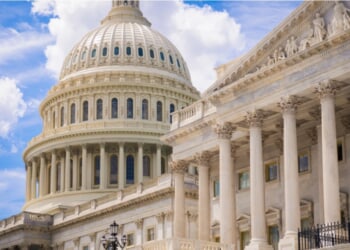What happened to America’s pioneering spirit? According to a new Pew Research report published this month, Silicon Valley tech experts are more confident than the general public that AI will benefit future Americans. Yet, the same report reveals that neither experts nor everyday citizens believe the government will go far enough in regulating the novel AI industry. When did the government become the industry referee?
In fact, tech innovators have long professed this pro-regulation attitude towards AI. After OpenAI’s ChatGPT model went viral in 2022, OpenAI CEO Sam Altman went to Washington, D.C., and begged Congress to make his life significantly harder. Altman publicly pleaded for federal regulation to tame his own product and his own company. (RELATED: Is China Pulling Ahead on AI?)
It’s puzzling that Sam Altman, by all measures a highly agentic Silicon Valley tech founder, thought himself incapable of controlling a device of his own design. But Altman is not unique. His instinct toward regulation reflects a fundamental shift in American life — we substituted swaggering American self-reliance for regulation. We’ve entered a new age where many Americans are more comfortable relying on a paternal federal government than relying on themselves. (RELATED: Removing Export Rules on AI Should Be a Priority for the Trump Administration)
The American frontier has always excelled because of a uniquely American ideal of rugged individualism. These frontiers came in three distinct eras: the Founding Frontier, the Western Frontier, and the Technological Frontier. The Founding Frontier was tamed by persecuted religious groups who made dangerous passage to a completely new and deeply hostile world, with nothing but each other to rely on. As the East became too crowded, the Western Frontier emerged, once again, tamed by adventurers forced westward. Then came the Technological Frontier, fostered by Henry Ford through to Steve Jobs, inspiring the best and brightest to build things their own way.
Somewhere in the past few decades, the most famous Technological Frontierists turned their back on the ideals that got them there in the first place. Mark Zuckerberg is our perfect case study. He was a “move fast and break things” debutant in Silicon Valley who saw his own technology topple totalitarian regimes in the Arab Spring. Less than a decade later, he bent the knee to Congress and described social media regulation as “inevitable.” Fast forward to today, and Sam Altman’s trip to Congress is dismaying, but not entirely surprising. What changed?
In times of crisis, it’s only natural for people to look to an institution for help. For most of human existence, people turned to religion. Famines and droughts in Meso-America were answered by Pagan priests conducting human sacrifice to reclaim their god’s favor. The Black Death granted carte blanche to the Catholic Church, leading to ruthless persecution across the European Continent. (RELATED: Christianity, Inc.: The Rise of Silicon Valley’s False Prophets)
It’s not just institutions that thrive in crisis, but strongmen. Napoleon, Julius Caesar, and Adolf Hitler all came to power during times of great domestic crisis. When FDR promised to wrestle America out of the Great Depression, he hijacked the human desire for strong institutions away from conventional religion, forging a new faith in the federal government.
Faith in government turned to reliance on the federal government during the next major economic crisis in 2008, when the Bush and Obama administrations jointly blamed the free market instead of their own heavy-handed government intervention. By blaming the free market, then bailing out big banks, Americans became comfortable with the idea that gains should remain with private companies, but losses should be shared across the population in the form of bail out packages.
Sam Altman encapsulates this idea perfectly. He shifted his own company from non-profit to for-profit, while also insisting that the federal government must act to prevent Open AI from developing too quickly. In other words, the gains stay with Altman, but the losses could be blamed on the broader American public for not pressuring our representatives in Congress to restrict AI development.
Imagine if regulators had placed a speed restriction on Henry Ford’s Model T; such a move could have prevented significant technological advancements that improved society and helped us win a world war. AI is no different. The technology might not be good enough to approach the guardrails yet, but who knows what significant innovations might be prevented by overbearing regulation. If Altman is truly as scared of his technology as he appears, he has the power to set those limits himself. But by forfeiting that power to the government, he jeopardizes the potential of the whole enterprise.
On the American frontier, sometimes things don’t work. Sometimes people fail, and sometimes people get hurt. We used to applaud failure and pain as an opportunity to grow, and that uniquely American perseverance pushed us to the moon and back. Now our Frontiersmen hide behind the government, abdicating responsibility for what they have created and giving up the chance to improve and grow. If we want to continue leading global innovation, we must hold ourselves and our innovators to higher standards of self-reliance, remembering that the American Frontiers were founded and settled away from the prying eyes of government, not right under its nose.
Davis Van Inwegen is a contributor for Young Voices, a third-year law student at Wake Forest University School of Law, and an incoming litigation fellow at Pacific Legal Foundation. Follow him on X @bigdave1789.
READ MORE:
Andrew Breitbart, Mark Zuckerberg, and the Two-Way Politics-Culture Street

![NYC Tourist Helicopter Falls into Hudson River, Siemens Executive and Family Among Those Killed [WATCH]](https://www.right2024.com/wp-content/uploads/2025/04/NYC-Tourist-Helicopter-Falls-into-Hudson-River-Siemens-Executive-and-350x250.jpg)






![Green Day’s Cringe Trump Diss Ends in Fire and Evacuation [WATCH]](https://www.right2024.com/wp-content/uploads/2025/04/Green-Days-Cringe-Trump-Diss-Ends-in-Fire-and-Evacuation-350x250.jpg)
![Red Sox Fan Makes the ‘Catch of the Day’ with Unconventional ‘Glove’ [WATCH]](https://www.right2024.com/wp-content/uploads/2025/04/Red-Sox-Fan-Makes-the-‘Catch-of-the-Day-with-350x250.jpg)
![Bikini Clad Spring Breakers Prove Our Education System is Failing Students [WATCH]](https://www.right2024.com/wp-content/uploads/2025/03/Bikini-Clad-Spring-Breakers-Prove-Our-Education-System-is-Failing-350x250.jpg)




